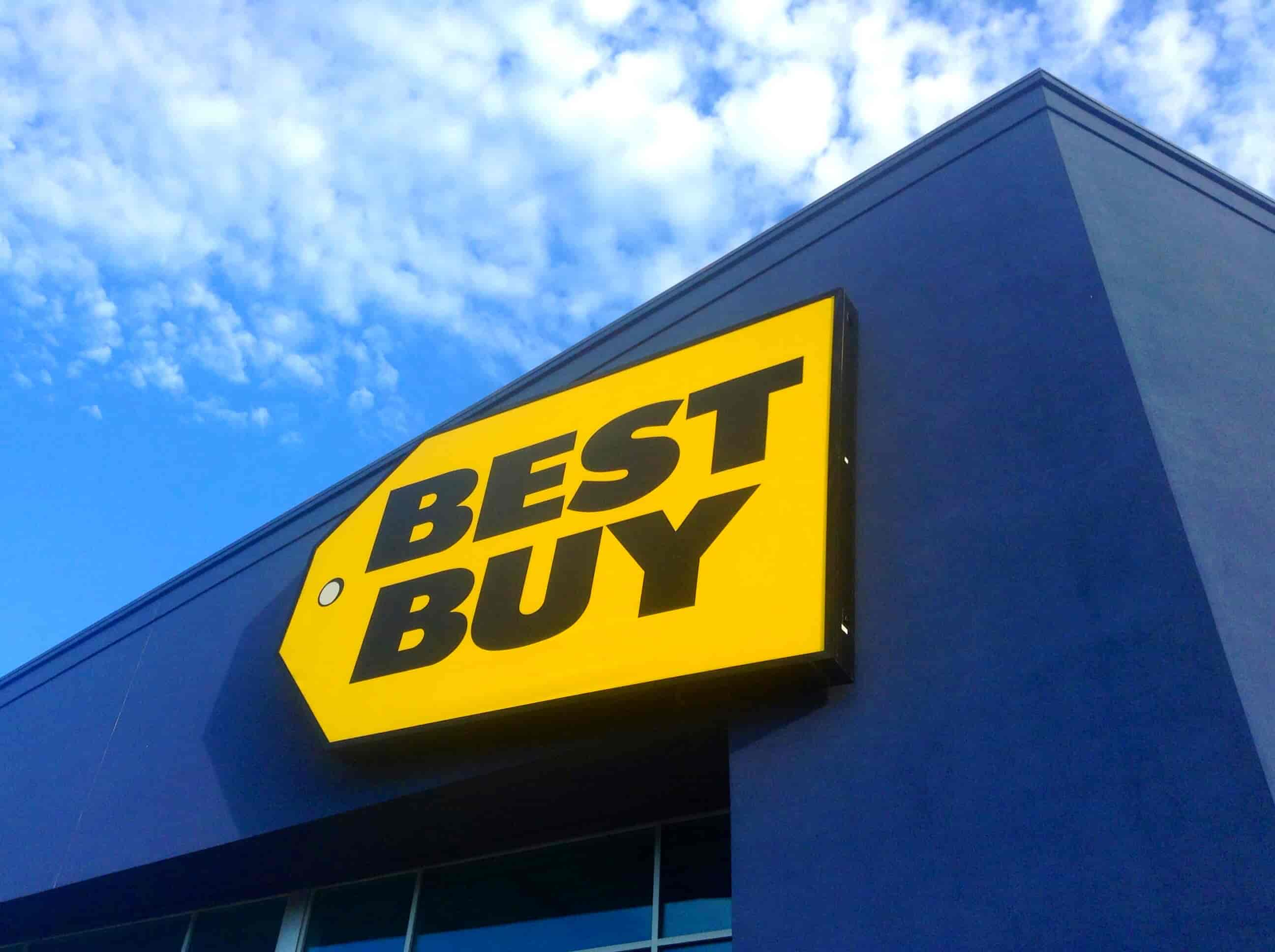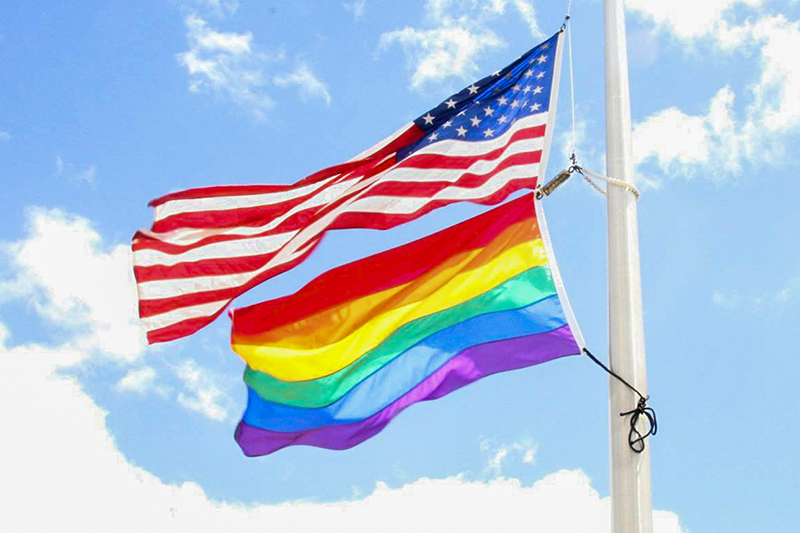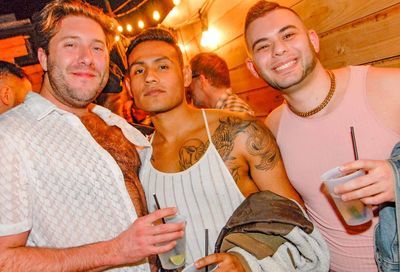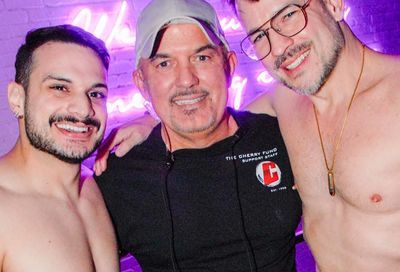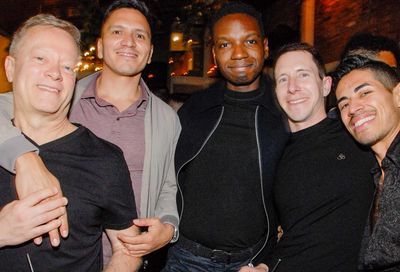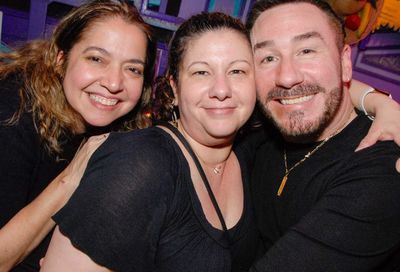Q&A: Mayoral Candidate David Catania
Longtime Councilmember David Catania tries to convince voters he's the best -- and most progressive -- choice in the race for mayor
By John Riley on October 8, 2014 @JRileyMW

Photo by Todd Franson
MW: And what do you think that tells us about you personally?
CATANIA: Well, you know, after 17 years of being on the Council, and visiting every corner of this city, I can speak with authority on the fact that we all believe in our city, and we all have the same value system. In every neighborhood and every community in this city, there is a strong belief in equality of opportunity. There’s a strong belief in the importance of playing by the rules, and in the importance of fairness. And I’ve tried to govern, I’ve tried to be an architect of solutions that advance those values and tackle issues that advance those values.
And, like all of us, we are informed by our own life circumstances. I don’t know how you would classify Georgetown or Georgetown Law School, both of which I graduated from — some would use the word “elite” or “competitive” or “selective,” “expensive” — but I was lucky. I wasn’t born with a silver spoon, but I was born with a golden ticket — I was lucky enough to be born in this country, where there was a chance for someone like me to succeed.
My mother raised me by herself. She had me when she was 20. She was herself orphaned at 16, her mother had died when she was 6 years old, and her father at 16. So she didn’t finish the 10th grade. So I was raised by a single mother without a high school education. But I was never led to believe we were anything but very lucky, and that, as long as I worked hard and played by the rules, with an education, I’d have a chance. And so what I want for our city, for every mother in the city, is what my mother wanted for me, which is for children to have a chance. And that’s why I work so hard to make sure that there is equality of opportunity, and that we do play by the rules, that there is a sense of fairness. Because I think there’s enormous untapped talent in our city, and the legacy of racism and economic inequality is really keeping us from unleashing what is a reservoir of talent and opportunity that will be spectacular when we accomplish it.
MW: What has prompted you to run for mayor of D.C.? Why should voters specifically elect you?
CATANIA: When I first began public service, the city was in a very different place. And over the last 17 years, we’ve had a really incredible reversal of fortune. And preserving that trajectory, preserving our incredibly good fortune will require a mayor with a particular set of skills. They include experience, and values, and I think that, of those in the race, I possess the combination of those.
I mention my record and experience on purpose, because it’s a reflection of the things that I care about and the issues I’ll tackle, whether or not I’ve been successful. When you have no record, what you are asking people to do is take a leap of faith that you can accomplish something. And especially when you have had a chance to do public service, having a record that is very thin can cause one to wonder.
As far as values, I share the values of the vast majority of our residents. As far as vision, I released a 126-page mission statement last week, where I attempt to articulate, in 10 disciplines or different areas, where I want to take the city. We can’t rest on our laurels. The year I was born, Detroit had a higher standard of living than New York City, Cleveland had a higher standard of living than Boston. If we’re not careful, if we don’t pay attention to the fundamentals, we can see ourselves, once again, in a less favorable place.
So I’m running for mayor to improve our public school system, and to continue the work I started a year-and-a-half ago as chairman, to continue to tackle the issues of health disparities, to create an affordable housing regime that is fair and not so Darwinian, and, very importantly, going to look at how we’re going to expand our economy going forward, beyond law firms and government. While these two industries have been good to us, they are not growing. We have to look at how we’re going to provide opportunities for our residents going forward.
MW: You were first elected in a special election against Arrington Dixon, a sitting Democratic councilmember with a lot of name recognition. How does this election compare to that election? What’s your path to victory?
CATANIA: Well, you know, it’s very similar, because the person I was running against in 1997, in what people considered to be quite an uphill battle, had taken his position for granted. He didn’t debate, didn’t engage, didn’t feel the necessity to advance ideas on how we would solve our problems. He simply felt he would rest on name recognition and party label, to secure victory. And the residents of D.C. decided differently.
This cycle, not only do I have the benefit of a record, but I’ve put out a pretty extensive vision statement that explains precisely how I intend to go about governing, and the issues that are going to be front-and-center in the administration I lead. My principal opponent, in particular, has largely refused to engage in debates, and has not put forward views with specificity about how she will secure the District’s future. So it does seem very similar. It’s most similar in that there was very little enthusiasm for my opponent in 1997, and I don’t sense a great deal of enthusiasm for my principal opponent in this race. There are just variations of entitlement. And I think our residents deserve more, and have a way of letting you know that.

MW: What’s also interesting about your candidacy is you’d be a lot of “firsts” for the District —
CATANIA: Oh, my God, I mean, usually it’s if someone breaks one glass ceiling, you call it a day. I’m trying to break them all. The first white mayor since Reconstruction, the first openly gay man, the first, at least since Home Rule, independent mayor. I think I’d be the first Georgetown graduate as mayor. There are actually a number of firsts. But there are three big ones: the first openly gay, the first independent, the first white mayor. That’s a lot.
MW: Do you believe that any one of those factors –- your sexual orientation, your race, or your former Party affiliation — hurt you in the eyes of potential voters? Does one hurt you more than any other?
CATANIA: Well, look, I left the [Republican] Party over 10 years ago. The Republican Party that exists today doesn’t bear any resemblance to the one I was raised with, and I left the party 10 years ago after doing my best to try and bring it towards the middle. I did everything to try to get a different point of view across, and I’d been dissatisfied with the party for years leading up to the president calling for a constitutional amendment [to ban same-sex marriage]. That was the straw that broke the camel’s back. For people who claim that was the only reason I left the party, far from it, it was the last in a series of slights, and the recognition that the party was never going to change.
But of all of those things, who’s to say? I don’t have time to dissect what’s the biggest area. I think you combine enough of these characteristics and I became a bit of a duck-billed platypus. Like, what’s going on up here? How, in spite of all these things, am I am competitive candidate for mayor in our nation’s capital? How did that happen? What is it about the many contradictions that appear to exist, but in fact don’t, in this candidacy? It might be that I’m competitive because I have the best record, the best vision, and have delivered more for more people in this city than all of the other candidates in this race combined. And I do focus a lot on numbers. When I talk about 10,000 married couples, that didn’t happen by accident. It happened because one person got out of bed and decided to take on many of the entrenched interests against it.
And people say, “Well, it was the District of Columbia, most of the members of the Council, were on record as being supportive.” That may be true. But they didn’t step forward, and privately cautioned me, and I think, many, would have rather we not moved forward. We were confronting a divided LGBT community at that point, including some of our city leaders who didn’t want to go forward. Negotiating religious freedom exemptions with the Catholic Church fell to me, and not to others. So someone had to get out of bed and force the issue.
So I think the reason I’m competitive and will win this race is people have seen a long record of accomplishment and a long record of concern. I just don’t talk –- so many people running for office just talk –- I don’t have time for that. And the flip side is, if you do get in there, is if you fight for people, you’re going to offend many people. And that’s the point.
MW: On that note, the press in Washington seems absolutely obsessed with making an issue of your temperament, bringing up Council battles between you and Marion Barry. They say you are short-tempered and unable to act diplomatically. Do you think you have a temper?
CATANIA: I don’t believe I have a temper. Temper suggests a loss of control, and somebody who is irrational. I have a lot of passion. I don’t have a temper.
With respect to Marion, he and I have had a long Council history and friendship. And I use the word “friendship” purposely. I was very fond of his former wife, Effi Barry. Marion’s a friend of mine — we routinely talk on the phone, we have a relationship. Usually, when Marion and I are going at it, it has something to do with the way in which we should conduct our business as a city. And I believe we should conduct our business above-board and ethically, and that government should be an instrument for self-interest. How’s that for diplomatic?
Yesterday, as a matter of fact, as a joke, I was giving a keynote speech in Marion’s ward for the opening of the new Friendship Technology Prep High School. And Marion made some comment about almost dying, and I actually confirmed that, because when Marion was in the hospital in January and February, I’m the only person in government who visited him in every single hospital he was in during that two-month period. I went to Howard, I went again to National Rehab, then I was at MedStar Washington Hospital Center. I was with Marion and on the phone with him constantly, because we are friends, regardless of whether we sometimes mix it up. And I joked yesterday that at the Hospital Center, Marion was so sick in the ICU that he told me he loved me. And of course, the crowd roared with laughter. And my response was, “Marion, you’re not my type, and I have a boyfriend.” And of course, that one was pretty funny as well.
The point is: you can have complicated friendships, and complicated relationships. But I don’t intend to make any apologies for having passion,
Shareholders Pressure Best Buy to Stop LGBTQ Donations
An email exchange shows right-wing shareholders pressured Best Buy to halt donations to LGBTQ organizations.
By John Riley on April 2, 2024 @JRileyMW
Electronics retail giant Best Buy offered to screen donations from its employee resource groups going to LGBTQ organizations or causes after being pressured by a conservative think tank that holds shares in the company.
According to a Securities and Exchange Commission filing recently made public, Best Buy engaged in a months-long email exchange with the National Center for Public Policy Research, a self-described "nonpartisan, free-market conservative think tank."
In those emails, which began on December 11, 2023, NCPPR sent the company a shareholder proposal asking the retailer to produce -- and distribute at its annual shareholder meeting in June -- a report analyzing how its partnerships with LGBTQ organizations benefit the company's business, according to NBC News.
Mpox Cases on the Rise in Virginia
Virginia Department of Health data shows that the number of mpox infections since January 1 has already exceeded last year's total.
By John Riley on March 26, 2024 @JRileyMW
The Virginia Department of Health has reported a recent increase in mpox infections in the state.
According to Health Department data, there have been 14 reported cases of mpox since January 1. Four of these required patients to be hospitalized.
The number of cases of mpox in 2024 has already surpassed the total number of cases reported last year. Of the 2024 cases, six occurred in individuals co-infected with HIV, and all cases occurred among individuals that were not vaccinated against mpox.
The cases are spread over four separate health regions: the Northern region, which includes the D.C. suburbs; the Northwest region, including the far-out exurbs of D.C. and the Northern Shenandoah Valley; the Central region, including Greater Richmond and Southside Virginia; and Eastern Virginia, including the Northern Neck, Hampton Roads, and the Eastern Shore regions.
Republicans Force Biden to Sign Pride Flag Ban
Biden agreed to a Republican-backed provision in the spending bill that prevents Pride flags from being flown outside U.S. embassies.
By John Riley on March 25, 2024 @JRileyMW
Pride flags are officially banned from flying above U.S. embassies.
The provision, part of a larger $1.2 trillion bipartisan spending bill to keep the government funded through September 30, was signed into law by President Biden on March 23.
Under the provision, no government funds may be used to fly or display any flag over any State Department facilities, unless that flag is the United States flag, a state or tribal government flag, an official agency flag, the POW/MIA flag, the Hostage and Wrongful Detainee flag, or -- as in the case of embassies -- the sovereign flag of other countries, reports NBC News.
Support Metro Weekly’s Journalism
These are challenging times for news organizations. And yet it’s crucial we stay active and provide vital resources and information to both our local readers and the world. So won’t you please take a moment and consider supporting Metro Weekly with a membership? For as little as $5 a month, you can help ensure Metro Weekly magazine and MetroWeekly.com remain free, viable resources as we provide the best, most diverse, culturally-resonant LGBTQ coverage in both the D.C. region and around the world. Memberships come with exclusive perks and discounts, your own personal digital delivery of each week’s magazine (and an archive), access to our Member's Lounge when it launches this fall, and exclusive members-only items like Metro Weekly Membership Mugs and Tote Bags! Check out all our membership levels here and please join us today!
The Magazine
-
Most Popular
 Biden's New School Rules Protect LGBTQ Students
Biden's New School Rules Protect LGBTQ Students  School Board Cancels '30 Rock' Star's Anti-Bullying Talk
School Board Cancels '30 Rock' Star's Anti-Bullying Talk  Conservative Ad Makes Case for Transgender Rights
Conservative Ad Makes Case for Transgender Rights  Aaron Rodgers Suggests AIDS Was Created by U.S. Government
Aaron Rodgers Suggests AIDS Was Created by U.S. Government  Mosaic's 'Nancy' is a Pungent, Absurdist Satire (Review)
Mosaic's 'Nancy' is a Pungent, Absurdist Satire (Review)  Mississippi Man Accused of Slaughtering Ex-Boyfriend
Mississippi Man Accused of Slaughtering Ex-Boyfriend  LGBTQ Websites Could Be Sued Under Kansas Anti-Porn Law
LGBTQ Websites Could Be Sued Under Kansas Anti-Porn Law  The Powerful Story Behind David Archuleta's ‘Hell Together’
The Powerful Story Behind David Archuleta's ‘Hell Together’  How Vending Machines Can Save Lives in Substance Abuse Crisis
How Vending Machines Can Save Lives in Substance Abuse Crisis  Star Trek Discovery's Wilson Cruz Keeps Making Television History
Star Trek Discovery's Wilson Cruz Keeps Making Television History
 Biden's New School Rules Protect LGBTQ Students
Biden's New School Rules Protect LGBTQ Students  School Board Cancels '30 Rock' Star's Anti-Bullying Talk
School Board Cancels '30 Rock' Star's Anti-Bullying Talk  Aaron Rodgers Suggests AIDS Was Created by U.S. Government
Aaron Rodgers Suggests AIDS Was Created by U.S. Government  LGBTQ Websites Could Be Sued Under Kansas Anti-Porn Law
LGBTQ Websites Could Be Sued Under Kansas Anti-Porn Law  HRC's Kelley Robinson Makes the Time 100 List
HRC's Kelley Robinson Makes the Time 100 List  Grindr's New Feature "Roam" Connects Users Around the Globe
Grindr's New Feature "Roam" Connects Users Around the Globe  Kansas Governor Vetoes Trans Health Care Ban
Kansas Governor Vetoes Trans Health Care Ban  Court Blocks West Virginia Trans Athlete Ban
Court Blocks West Virginia Trans Athlete Ban  DC Black Pride 2024: Everything You Need to Know
DC Black Pride 2024: Everything You Need to Know  Conservative Ad Makes Case for Transgender Rights
Conservative Ad Makes Case for Transgender Rights
Scene
Metro Weekly
Washington's LGBTQ Magazine
P.O. Box 11559
Washington, DC 20008 (202) 638-6830
About Us pageFollow Us:
· Facebook
· Twitter
· Flipboard
· YouTube
· Instagram
· RSS News | RSS SceneArchives
- "We use cookies and other data collection technologies to provide the best experience for our customers. You may request that your data not be shared with third parties here: "Do Not Sell My Data
Copyright ©2024 Jansi LLC.




